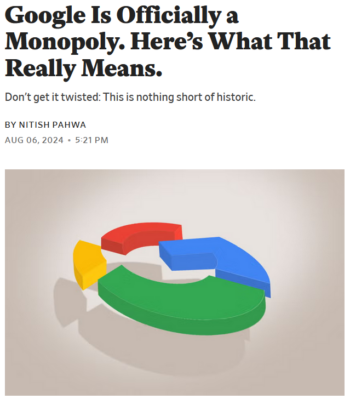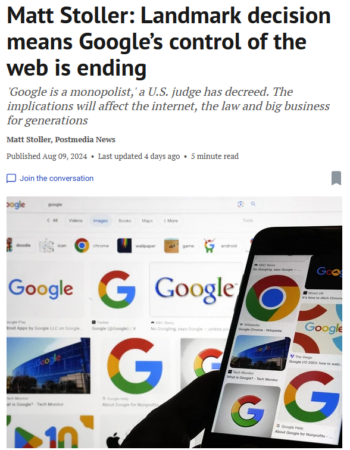Janine Jackson interviewed the American Economic Liberties Project’s Lee Hepner about the Google monopoly for the August 9, 2024, episode of CounterSpin. This is a lightly edited transcript.

Slate (8/6/24)
Janine Jackson: “Google is a monopolist, and it has acted as one to maintain its monopoly.” So ruled district court Judge Amit Mehta in United States v. Google, being called a “landmark” antitrust case that will affect not just Google, but potentially all tech giants in the current landscape. The point was, Google pays billions every year to companies like Apple and Samsung that distribute search engines, to ensure that it’s the only search engine anyone would see, by making sure it’s the preset default on devices.
If your supermarket only had one brand of milk on the shelf, even if it had some others in the back, you would recognize that as unfair. But for many of us, the internet is still a mystery miracle, and we’re not used to bringing the same sorts of questions to bear. If it did nothing else, this ruling changes that.
So what happened? Lee Hepner is an antitrust lawyer and senior legal counsel for the American Economic Liberties Project. He joins us now by phone; welcome to CounterSpin, Lee Hepner.
Lee Hepner: Thanks so much for having me.
JJ: The Sherman Antitrust Act sounds like a history lesson. It’s from 1890, but it’s living, meaningful law. How or why exactly did the judge determine that Google was in violation of it?
LH: You said it right there. This law that dates back to the 19th century, that used to be used against railroad barons, has now been applied to this new tech industry. It’s really proof of the durability of one of the foundational laws for ensuring fair markets and competition across our economy.
And Google is ripe for being addressed by this law. The judge found that Google was essentially without competition in the market for search engines, and truth be told, I mean, 80% of overall searches are conducted via Google; on mobile devices, that’s 95%. And Google is able to profit extraordinarily off of not having competition, and by blocking out rivals who threatened to create new and innovative products that actually benefit consumers and move this technology forward. So that was really at the crux of the judge’s decision in this case.

National Post (8/9/24)
JJ: So it isn’t just that Google is the default search engine; it’s that they are doing things, including paying money, to maintain that, and to prevent other companies from being that.
LH: That’s exactly right, and the judge really eloquently, in his opinion, describes how Google maintains its power through that circular system. It pays for exclusive agreements across Apple, Samsung, Mozilla, other device manufacturers, and by virtue of those exclusive agreements, it achieves scale that it then sells to advertisers for extraordinary revenue, and then it reinvests that revenue back at the beginning, in securing those exclusive agreements. So you really see how this is a self-reinforcing monopoly that Google has been able to maintain through anti-competitive conduct.
JJ: And we know it’s not by accident, if anyone were to believe that. There are internal messages, I just read in a piece by Matt Stoller, where Google is saying, “Inertia is the path of least resistance.” They know what they’re doing.
LH: Oh, absolutely. It’s a clear monopoly strategy. And, just to be clear, those are the communications that we were able to see. Google was also criticized by this judge for deleting untold number of records that were relevant to the litigation. And that was a big part of this case, too: what Google didn’t say, because they were training employees to move communications to secret servers and auto-deleted chats. So even in the absence of a smoking gun, there was a very clear sense that Google was intentionally perpetuating an illegal scheme to maintain its market power.
JJ: It’s worth noting that this isn’t just a meta-issue, or inconsequential. There is an impact of the quality of searches. Not everyone’s just looking for “Thai restaurant near me.” It matters if searches are not the best that they could be, yeah?

Lee Hepner: “Google has maintained its monopoly position, not necessarily by having a superior product, but by blocking out rivals.”
LH: Yeah. We’ve all heard stories about Google search becoming worse over time. It’s harder to find that thing that you were looking for, because they’re not necessarily investing in the rank of search results, or they’re prioritizing paid ads that look like organic search results. So Google has maintained its monopoly position, not necessarily by having a superior product, but by blocking out rivals. And that’s just the core characteristic of monopolies that is as old as time, and we see across a lot of industries.
JJ: Yeah, I was just going to say, Google is not being punished for building a better mousetrap. And news media, I think, play a role here for the anthropomorphizing of, especially, tech companies as scrappy, as game changers: They’re not AT&T. We’ve been trained to think, these guys–and they are guys–break the rules, but on behalf of all of us. And that’s not what’s happening here.
LH: Sure, and it’s just a radically different industry than it was, say, in the early 2000s, after we broke up the last big monopoly, Microsoft. That was a quarter century ago since the last decision on a case brought by the government against a big monopoly.
And then we were seeing that kind of scrappy innovation. Google was a startup at that point, and I think that right there really lends to the potential of this case, and of this decision, to unlock a new era of innovation, where small tech innovators are able to have a chance at entering the market, and creating something new and cool that maybe we can’t imagine today, but wouldn’t be possible without breaking up Google‘s hold on this industry.
JJ: I was going to ask you, what do you think happens now? We can’t necessarily predict it, but in terms of the case, what do you think will happen as we look to the remedy stage of things?
LH: Just to be clear, this is a case that was bifurcated. We just concluded the liability phase, and now the judge has to decide what to do about it. And what’s good about this stage is that the court has broad latitude, and must be deferential to the government’s request for remedies after that really difficult finding of liability.
And there’s a lot of tools on the table. Certainly we can expect an end to some of the exclusive agreements that have tied up this market for Google. But we also might see structural remedies that deprive Google of some of its ill-gotten gains, and divest certain business lines, or allow other search engines to have access to properties like Google‘s web indexer, or even their large language model.
The future of search is really in artificial intelligence, and the ability of chatbots to really revolutionize how people get information off the internet. And so I think that we’re going to be really clued in to how this court crafts remedies that ensure that that next era of AI innovation is not being controlled by Google, or any other dominant player in this market.

The Nation (11/10/23)
JJ: And then, finally, do you see knock-on effects? It does seem like a paradigm shift in terms of antitrust and the way we think about big companies. Do you see knock-on effects on, not just tech companies, but other big businesses?
LH: I do. And I think that when you have a case of this magnitude, there is going to be a bit of a culture shift. So if I’m a big law firm advising my clients, I’m going to tell them, “Hey, if you are entering into these types of exclusive agreements that are intended to maintain your market power, maybe you shouldn’t do that anymore, because the court is looking at these agreements with fresh eyes, and they’re not passing muster.”
I also think this decision builds momentum behind some of the other cases that the government has brought. There are parallels to the case against Live Nation, which also uses Ticketmaster to enter into exclusive agreements with venues. There are other parallels to the case against Apple or Amazon, which also lock consumers into a single-product ecosystem. So there’s going to be knock-on effects outside of this case, outside of this industry, and also for other pending cases that we’re watching closely.
JJ: All right then; we’ll end on that note. We’ve been speaking with Lee Hepner, senior legal counsel at the American Economic Liberties Project. They’re online at EconomicLiberties.us. Thank you so much, Lee Hepner, for joining us this week on CounterSpin.
LH: My pleasure. Thank you for having me.
This post was originally published on FAIR.